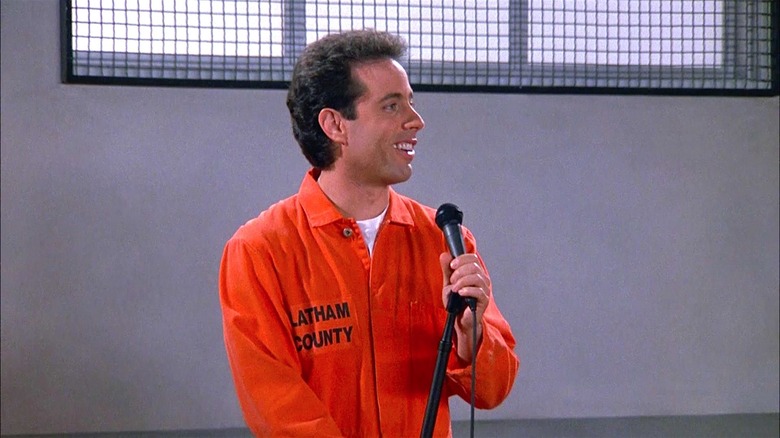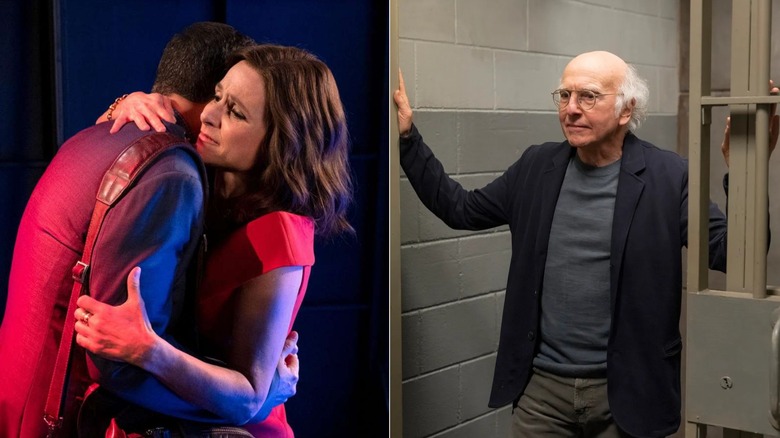What Jerry Seinfeld Regrets The Most About Seinfeld's Finale
Although I'm on record saying that the "Seinfeld" series finale was good, and Larry David never should've apologized for it, it's undeniable that a lot of people disagree, especially in the episode's immediate aftermath. "Sitcom's finale found guilty of mediocrity" wrote one headline at The Des Moines Register. "It delivered many fewer yucks than yadas," said Howard Rosenberg at the LA Times. "Seinfeld should have quit while it was ahead. Better yet, it should've quit last week," said the Fr. Lauderdale Sun-Sentinel.
Although most of the cast and crew stuck up for the ending over the years, Jerry Seinfeld has voiced some regrets. He still mostly stands by it, he just wishes he could've changed one part. "I think the only mistake, if there was one, was leaving them in jail," he said in a May 2024 interview, "We didn't really have to do that."
This was reflected in the "Curb Your Enthusiasm" series finale, which plays out exactly the same as the "Seinfeld" finale except that Larry (who wrote the "Seinfeld" finale) gets bailed out of prison at the last second. Larry remarks that this is totally what they should've done the first time around, and that's the end of the prison storyline. This was presented in "Curb" as an example of Larry David redeeming himself for a past mistake, which is a shame because this is one of the few times where David should've stuck to his guns.
Could a happier Seinfeld ending have worked?
A major argument in favor of the "Seinfeld" finale is that it finally punishes Jerry, George, Elaine and Kramer for their lifetime of increasing selfishness. Although the gang's actions are always at least somewhat relatable and sympathetic, throughout the show, there's a growing callousness to their actions. Would the season 1 gang have reacted so coldly to Susan's season 8 death? Probably not, because their moral descent was slow and steady, the sort of thing that you don't even notice until something big happens to force the issue into the spotlight. That's exactly what the finale did.
(Warning: spoilers for the HBO show "Veep" below.)
Still, there probably was a way to point out the gang's inhumanity without the total bummer of leaving them in jail for a year. Perhaps the smarter choice would've been to do what "Veep" did 20 years later, by exposing the evil of the main characters not by giving them their karmic retribution but by letting them achieve their dreams. After all, Selina Meyers (Julia Louis-Dreyfus) in "Veep" has a similar arc to the "Seinfeld" characters, where the extent of her immorality gradually grows over the course of several seasons, to the point where you barely even realize how much worse she's gotten until it's far too late for anyone to stop her.
But "Veep" didn't end by judgmentally punishing Selina for her many crimes; it ends by letting her get away with them. Her condemnation doesn't come from a judge or jury, but from the audience, who's now watched her descend from being evil in a funny sitcom way to being evil in a disturbing, unforgivable way.
I still enjoy how "Seinfeld" yanks the audience out of a sitcom perspective and forces them to re-evaluate the gang by real-world standards. But perhaps the best way to pull off that last-minute subversion was by letting the gang win, not making them lose. Make they really should've gotten off on a technicality, with the finale's closing moments showing them continuing their selfish lives without learning a thing. When Jerry bailed Larry out of prison in the "Curb" finale, telling him, "Nobody wants to see this," perhaps he really did have the right idea.

